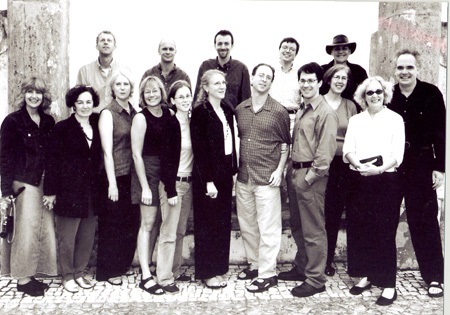Engaging All the Senses: Colonialism, Processes of Perception, and Material Objects
Date
Sep 26 - Oct 2, 2003Organized by
Elizabeth Edwards, Chris Gosden and Ruth B. PhillipsLocation
Hotel Palácio de Seteais, Sintra, PortugalPublications
Sensible Objects: Colonialism, Museums, and Material Culture (Elizabeth Edwards, Chris Gosden, and Ruth B. Phillips, Eds.), Berg, Oxford, 2007.Participants
- Ngahuia Te Awekotuku University of Waikato, New Zealand
- Timothy Barringer Yale University, USA
- Liam Buckley James Madison University, USA
- Elizabeth Edwards University of Oxford, UK
- Jeffrey Feldman New York University, USA
- Richard Fox Wenner-Gren Foundation, USA
- Kathryn Geurts Hamline University, USA
- Chris Gosden University of Oxford, USA
- David Howes Concordia University, USA
- Aldona Jonaitis University of Alaska Museum, USA
- Frances Knight University of Oxford, UK
- Diane Losche University of New South Wales, Australia
- Sven Ouzman National Museum, South Africa
- Ruth B. Phillips Carleton University, Canada
- David Sutton Southern Illinois University, USA
ORGANIZER’S STATEMENT: As its complex sub-title indicates, this conference on “Engaging All the Senses” was an attempt to tackle a range of connected issues concerning how we sense objects, how different sensory orders clash through the encounters of colonialism, and to what degree we can evoke different orders of sensory perception through museum display. To some extent each of these topics has been considered separately, so that a renewed interest in material culture on the one hand and the nature of human experience on the other has brought a consideration of the senses to the fore. Discussions of colonialism have not been able to explore the visceral impact of cross-cultural encounters fully, mainly because the sensory dimension has been ignored. Museums chafe under the restrictions on modes of representation and display, so that looking is allowed, where touching is not, with smell and sound hard to incorporate into modes of exhibition. This has led to the paradox that, although the senses are crucial in appreciating, valuing and using material culture, the importance of the senses has been poorly explored in the academic literature and displays of objects. As one result of this, our understanding of colonial encounters is lacking richness and depth. The main themes of the conference were laid out in an introductory session, in which the participants also introduced themselves and their work. Because this is an area of inter-disciplinary research, there followed a session that defined key terms and directions for the symposium. After this came four sessions of paper presentations, each aimed at creating a more holistic conception of the senses, objects and colonial encounters.
In all, the group felt that they had moved a long way in their discussions of broad, difficult and interlocking topics. Discussion reinforced our original feeling that the senses need more attention within anthropology and museums, especially when exploring issues of colonialism. We all felt that considerable progress had been made in considerations of both the theoretical and practical dimensions of these issues, setting the basis for novel inspirations and forms of work.
